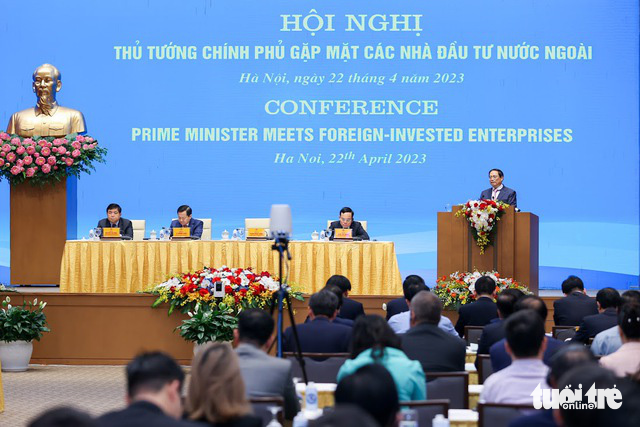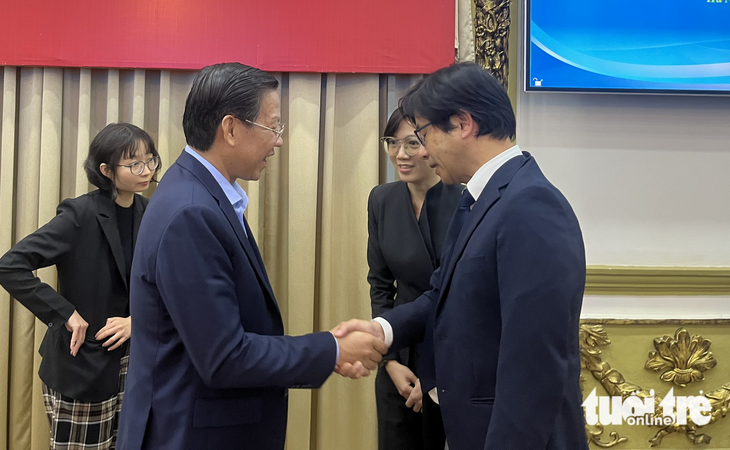Vietnam will offer the most preferential possible incentives to foreign-invested enterprises if the global minimum tax is applied to ensure the benefits of investors and the country’s economic growth, Prime Minister Pham Minh Chinh said at a meeting with foreign-invested companies in Hanoi on Saturday.
The government chief said Vietnam always attaches importance to the compliance with international law and proactively fulfilling international commitments, including a commitment on the global minimum corporate tax, initiated by the Organization for Economic Cooperation and Development.
The government has required reviewing and enhancing the attraction of foreign investment, PM Chinh noted, adding that Vietnam will offer non-tariff support that does not go against international regulations and commitments and ensure the benefits of relevant parties and fairness among enterprises.
|
|
| Prime Minister Pham Minh Chinh promises to create favorable conditions for investors to do business in an effective and sustainable manner in Vietnam. Photo: Vietnam Government Portal |
The support may be related to land, science, and technology study costs, administrative reforms, social housing, human resource training, and infrastructure development.
Vietnam will also review and improve its regulations and build a road map to apply the global minimum tax based on lessons from other countries’ experience and the reality in Vietnam.
The government has also proposed the lawmaking National Assembly improve visa policies.
Regulations on fire safety, medicines, medical equipment, and energy are being reviewed and amended as well.
The prime minister also required intensifying the analysis and assessment of the global market and the forecast of important issues to work out appropriate response plans.
|
|
| Chairman of the People’s Committee of Ho Chi Minh City Phan Van Mai (L) shakes hands with a Japanese investor. Photo: N.Binh / Tuoi Tre |
Earlier at the meeting, chairman of the People’s Committee of Ho Chi Minh City Phan Van Mai said Vietnam’s preferential tax policies on foreign investment attraction have yet to make breakthroughs while the Southeast Asian country will levy the global minimum tax from next year.
The southern metropolis attracted US$4.33 billion in foreign investment with the capital registered for the hi-tech sector accounting for some 65 percent.
However, its infrastructure and services have yet to meet the demands of investors and it is facing a shortage of industrial land to lure large projects.
The city is focusing on developing traffic infrastructure, logistics, green energy, and international education systems.
Chairman Mai suggested the prime minister quickly direct the removal of obstacles to immigration, import-export, and work permit application.
Meanwhile, Hanoi is accelerating and improving the quality of planning to remove foreign investors’ obstacles in land, said vice-chairman of the municipal People’s Committee Nguyen Manh Quyen.
The capital city will quickly complete a draft revised Capital Law and make a list of projects for investment attraction.
Hanoi is completing procedures to establish four to five industrial parks in the city to attract investors in hi-tech, Quyen informed.
As of April 20, Vietnam had hosted more than 37,000 valid foreign direct investment (FDI) projects worth nearly $445.9 billion. FDI disbursement had exceeded $279.8 billion, equivalent to nearly 62.8 percent of the total investment.
So far this year, the total FDI inflows in Vietnam reached nearly $8.88 billion, of which about $5.85 billion has been disbursed, news site Vietnamplus cited the Ministry of Planning and Investment as saying.
Like us on Facebook or follow us on Twitter to get the latest news about Vietnam!




Max: 1500 characters
There are no comments yet. Be the first to comment.